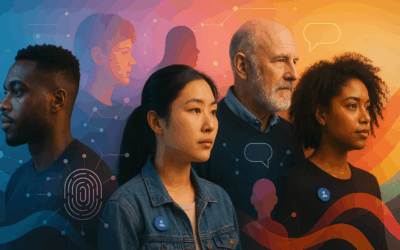What are the 72 genders?
At 72gender.com, we offer clear, accessible, and respectful information about the 72 gender identities that exist beyond the traditional male and female framework. The concept of 72 genders represents the broad and diverse spectrum of gender identities, helping people find the words and understanding they need to explore and express who they are.
Our goal is to create an educational and inclusive platform where anyone—whether they are questioning their gender, seeking knowledge, or simply learning—can find reliable information about gender diversity. We explain the meaning behind each of the 72 gender identities in a way that is approachable, accurate, and easy to understand.
We believe that respecting a person’s self-identified gender is essential to building a more inclusive and accepting society. By promoting understanding, empathy, and open-minded learning, 72gender.com helps increase awareness of all 72 genders and supports every individual’s unique gender journey.
All 72 genders
Information about the 72 genders

Latest blogs
What Are the 72 Genders? A Complete, Respectful Guide to Gender Identity
The question “What are the 72 genders?” is asked more often than ever. As conversations about gender diversity become more visible, many people are searching for clear, respectful, and accurate information. This guide is designed to explain the concept of the 72...
Identity trends in 2025 — How we define ourselves is evolving
by Sophie, writer at 72gender.com Identity isn’t a box I can tick anymore — and I don’t think I’m alone in that. Over the past year, I’ve heard from readers who feel their sense of self is shifting: in gender, in culture, in work, even in how they show up online. In...
Where the World Stands in 2025
By Sophie – writer at 72gender.com In 2025, conversations around gender identity are more visible than ever. From parliamentary debates to school policies, gender has become both a personal truth and a political topic. But how different that conversation looks across...
Varför 72gender.com finns – och vad listan över 72 könsidentiteter betyder
Av Sophie – skribent på 72gender.com Världen blir allt mer mångfacetterad, och vårt sätt att förstå kön och identitet har för länge sedan lämnat den traditionella indelningen i “man” och “kvinna”. Allt fler människor känner att dessa gamla kategorier inte speglar...
Por qué existe 72gender.com y qué significa la lista de los 72 géneros
Por Sophie – escritora en 72gender.com El mundo se está volviendo cada vez más diverso, y nuestra comprensión del género y la identidad ya no puede limitarse a las categorías tradicionales de "hombre" y "mujer". Muchas personas sienten que estas etiquetas antiguas no...
Warum 72gender.com existiert – und was die Liste der 72 Geschlechter bedeutet
Von Sophie – Autorin bei 72gender.com Unsere Welt wird immer vielfältiger. Auch unser Verständnis von Geschlecht und Identität lässt sich längst nicht mehr auf die traditionellen Begriffe „männlich“ und „weiblich“ reduzieren. Immer mehr Menschen spüren, dass diese...
Sophie Is Back — And So Is Our Gender & LGBTQ+ Blog
We’re excited to announce that the 72gender.com blog is back with renewed focus and fresh energy. Meet Sophie, our new weekly writer, who brings honest, thoughtful, and deeply human stories about gender identity, self-discovery, and LGBTQ+ life.
With more than 90 previously published articles covering topics such as gender identity, LGBTQ+ experiences, coming out, and chosen families, our blog already holds a strong foundation. Now, we’re building on that legacy with new voices and deeper perspectives.
Each week, Sophie explores subjects ranging from self-love and gender exploration to breaking societal norms and embracing diversity. Her writing is rooted in authenticity, empathy, and a strong sense of community—creating space for reflection, learning, and connection.
Whether you’re just beginning to explore the gender spectrum or have been part of the LGBTQ+ community for years, our blog offers insights, representation, and stories you can relate to.
New blog posts every week. New perspectives to discover. One shared mission: representation, understanding, and connection.

At what age does a child understand gender identity?
Your child may have questions about gender identity at any stage of life:
2-3
Age 2 to 3
Children this age know the difference between boys and girls. They can see themselves as a girl or a boy regardless of their sexual anatomy. They can even accept other genders who are still normal and healthy.
4-5
Age 4 to 5
At this age, children understand their gender identity. But as we age, we become more aware of gender roles, expectations, and stereotypes. For example, we believe that certain toys and clothes are only for boys or girls. At this age, your child may begin to express their gender more confidently. B. Prefers or dislikes wearing dresses every day.
6-7
Age 6 to 7
Children become more confident in themselves and their gender identities and are less afraid to express their gender. However, children who identify themselves as different from the gender they were assigned at birth may experience social anxiety and stress when they realize they don't fit into either category.
Gender identity
Gender identity, gender expression and non-binarity
Not everyone experiences themselves as strictly a boy or a girl, or later in life as a man or a woman. This inner sense of who you are is called gender identity. Gender identity describes how a person experiences and understands their own gender, regardless of their physical characteristics.
Gender identity is separate from biological sex, which refers to the physical traits a person is born with, such as reproductive organs and chromosomes. In some cases, a baby is born with variations in biological sex characteristics, meaning it is not immediately clear whether the child is biologically male or female. This is often referred to as intersex.
Another important concept is gender expression. Gender expression describes how someone presents their gender to the outside world. This can include clothing, behavior, voice, or appearance. Some people express themselves in ways traditionally associated with masculinity or femininity, while others express their gender in more diverse or fluid ways.
Gender identity, biological sex, and gender expression are all distinct aspects of a person’s experience. Together, they reflect the wide diversity of how people understand, express, and live their gender.
72 genders summarized in one list
72 Gender list
All genders are summarized in one list by 72gender.com. Read a description of each gender here and perhaps there is some form of recognition.
72 genders summarized in one chart
72 Gender chart
All genders are summarized in one graph by 72gender.com. Read here which genders are in the chart and view their symbols.
Meaning
Psychological gender
Gender represents aspects of gender behavior and identity that are distinct from physical and biological aspects.

Expression
Gender expression refers to how a person outwardly expresses their gender in everyday life. This can include the roles someone takes on, the clothes they choose to wear, their body language, voice, and the way they interact with others.
Gender expression is how the outside world perceives someone’s gender. It is visible and can change over time or depending on the situation. Some people express their gender in ways that align with traditional expectations of masculinity or femininity, while others express themselves in more diverse or nonconforming ways.
It is important to understand that gender expression is different from gender identity. Gender identity is a person’s internal sense of who they are, while gender expression is how that identity is communicated to the world. Someone’s gender expression does not necessarily indicate their gender identity, biological sex, or sexual orientation.
Together, gender identity and gender expression reflect the wide range of ways people experience and express their gender.

Attraction
Attraction refers to the romantic and/or sexual feelings a person may experience toward others. This is often described as sexual orientation and/or romantic orientation, which together explain who someone feels emotionally or physically drawn to.
Traditionally, distinctions are made between heterosexual (straight), gay, lesbian, and bisexual orientations. However, sexual and romantic attraction exist on a broad spectrum. Many people identify with orientations such as pansexuality, asexuality, demisexuality, and others, which reflect the diversity of human attraction.
Attraction is personal and can differ from person to person. It is also important to note that sexual orientation is independent of gender identity and gender expression. Who someone is attracted to does not define their gender, just as gender does not determine attraction.
Understanding attraction helps create space for visibility, respect, and acceptance of the many ways people experience connection and relationships.

Identity
Gender is a social and cultural concept that refers to how societies interpret and define femininity and masculinity. It encompasses the social roles, expectations, behaviors, and norms that are commonly associated with different genders.
These interpretations are not fixed or universal. What is considered masculine or feminine can vary greatly across cultures, communities, and historical periods. Gender is therefore shaped by social context and changes over time.
Because gender is socially constructed, individuals may experience and express their gender in ways that differ from traditional or dominant norms. This diversity highlights that gender is not limited to a single definition but exists along a broad and evolving spectrum of identities.
Understanding gender as a social construct helps create space for self-identification, personal expression, and respect for the many ways people experience and live their gender.

Discover your gender
Identity, expression, attraction and sex
Gender is something many people assume they understand, yet for most, it is far more complex. Gender is not binary and not limited to an either/or framework. For many individuals, gender exists as an and/and experience—a combination of identities, feelings, and expressions that can change over time.
Exploring your gender can raise questions, doubts, and uncertainty. Many people hesitate to talk about gender or sexuality, especially in surveys or conversations, out of fear of saying the wrong thing, using incorrect terminology, or unintentionally offending someone. These concerns are completely understandable.
Creating space for curiosity, learning, and respectful dialogue is essential. Asking questions and taking time to explore gender helps build understanding—not only of yourself, but of others as well. There is no single right way to experience or define gender, and exploration is a valid and meaningful part of many people’s journeys.
Have You Ever Questioned Your Gender Identity?
As awareness of gender diversity continues to grow, more people feel safe and supported in exploring their gender identity. This process can sometimes feel confusing or unsettling, especially when long-held beliefs shaped by society and cissexism are challenged. However, questioning your gender is not a problem—it is a natural and valid part of self-discovery.
Gender exploration can happen at any stage of life. Whether you are young or older, there is no timeline, no pressure, and no single “right” way to feel. Gender is deeply personal, often fluid, and may evolve over time. Taking space to reflect can lead to greater self-understanding, meaningful insight, and a stronger connection to who you truly are.








